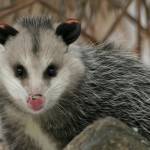Horse Feed Management and EPM Prevention

Equine protozoal myeloencephalitis (EPM) is a degenerative neurological disease that affects horses. Sarcocystis neurona, the protozoal parasite that is the most common cause of the disease, is believed to pass from certain types of birds to opossums. Horses can become infected by consuming feedstuffs contaminated with opossum feces. An infected horse cannot infect a normal horse; the parasite must come from the opossum.
Researchers have described several risk factors for the development of clinical EPM:
- Horses had increased risk for developing EPM in spring, summer, and fall when compared to winter;
- When all feed materials (hay and grain) were not secured from wildlife;
- When hay alone was not secured;
- When opossums had been observed on the farm;
- When there was a previous diagnosis of EPM on the farm;
- When horses were used as racehorses or show horses as compared to breeding or pleasure horses; and
- When horses had been ill in the 90 days prior to admission for EPM diagnosis.
Horses were at a decreased risk for developing EPM when feed was protected from wildlife and when the barn or pasture was close to a creek or river. (Creeks or river bottoms probably provide a more attractive habitat for opossums, decreasing the chance they’ll seek feed sources in the barn.)
To prevent EPM, opossums should be kept out of the barn and especially away from sources of hay, feed, and water. Keeping cats or dogs loose in the barn might help discourage midnight raids by opossums on the feed.
As long as feed ingredients were not contaminated before processing, bagged feeds may be safer than bulk feeds, particularly if the bulk feed is stored in a way that’s accessible to animals. Extruded feeds might be the most protective, as heat exposure during the extrusion process seems to kill the parasite before it is ingested by horses. Horse owners should reject any feed or hay that might be contaminated with animal feces.
Read more from Advances in Equine Nutrition III.








